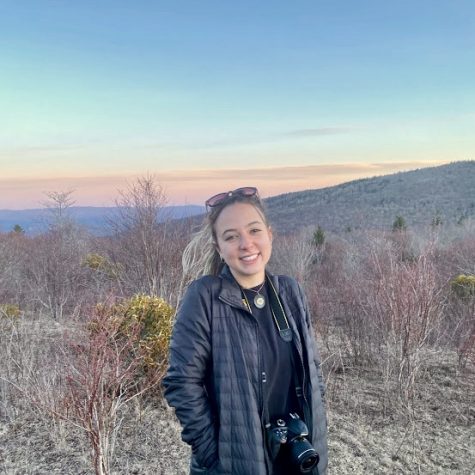Report shows faculty of color retiring early due to “toxic work environment”
December 28, 2021
At least 21 faculty and staff members of color have left or retired early from their positions at App State from 2015-21, according to the Faculty/Staff of Color Affinity Group Working Group Report presented at the Faculty Senate meeting Nov. 8.
Tammy Wahpeconiah, a Native American English professor and member of the Faculty/Staff of Color Affinity Working Group, presented the report to Faculty Senate, having worked on it since this past summer, she said.
At the meeting, the report got a majority vote, putting it in motion. The motion gives permission for it to be emailed to App State administration, faculty and staff members.
In the report, these faculty and staff members left due to either a “toxic work environment” for people of color, as Wahpeconiah described it, or they didn’t provide a reason.
“It is great to hire faculty of color to encourage students of color to come to the university,” Wahpeconiah said. “But my concern has always been the inclusion aspect. When people get here, if they are not made to feel like they belong, if they are not valued and validated, they’re going to leave.”
Current data shows that three-year and five-year retention rates for non-white faculty and State Human Resources Act staff at App State is larger than white faculty and SHRA staff, Megan Hayes, university spokesperson, wrote in an email. Hayes said retention rates for non-white, exempt from the State Human Resources Act staff are lower than white SHRA staff.
An affinity group survey “was sent to a small group with the purpose of determining the need for affinity groups on campus, and it did not meet the standards of a campus climate survey,” Hayes said.
Faculty members in the Faculty Senate meeting voted Nov. 8 to amend people’s identifiers for privacy of the staff involved. Before being released, they redacted identifiers such as their departments and specific quotes.
“I think this could be a wonderful place for people of color, but there is still a lot of work that needs to be done,” Wahpeconiah said.
The report also includes a list of requests for the university to create a more inclusive work environment and improve its retention rate. Some of the requests include creating an affinity group for people of color, establishing equitable tenure and promotion policies, and training hiring authorities on equitable salaries and cultural differences in negotiations.
Affinity groups are groups of people “having a common interest or goal or acting together for a specific purpose,” according to Merriam-Webster.
In her Oct. 27 message, Interim Chief Diversity Officer Jamie Parson wrote that she assembled a working group over the summer to address faculty and staff updates and to develop recommendations for serving underrepresented populations on campus. The results will be compiled in a report and shared in spring 2022.
“We value the input of different stakeholders on campus through formal and informal conversations to help shape the best ways to report the state of diversity, equity and inclusion on our campus,” Parson said.
Some of the recommendations from the report have been “underway for some time” and will be included in the spring 2022 report, Hayes said. This includes recommendations for affinity groups and recruitment and retention.
Hayes said Chancellor Sheri Everts approved a Faculty of Color Affinity Group, and Parson established an Affinity Group Council comprised of four existing affinity groups: The Black Faculty & Staff Association, Queer & Trans Staff and Faculty, App Unidos and the Asian & Pacific Islander Caucus.
“The university is expanding its ongoing efforts in faculty hiring practices, which include reviewing trainings and enhancing search committee resources,” Hayes said.
Faculty Senate chair Louis Gallien said one goal of the report is to create a culturally responsive environment in the university and the town of Boone that “not just tolerates people of color, but actually welcomes them and is prepared to handle some of the issues that are important to them.”
Gallien said Faculty Senate members are still absorbing the information in the report because members did not realize the extent of the low retention rate.
“If we’re going to advance the number of people of color, we’ve got to know why they’re leaving, why we haven’t been able to retain them,” Gallien said. “We don’t want a revolving door here of people of color on any level.”
SGA released a statement Nov. 9, calling on the university to make the report publicly available for students, create a strategic plan to improve low retention rates and reinstate the associate vice chancellor of equity position, which was last active in 2016.
Everts created the cabinet-level Chief Diversity Officer position when the Office of Equity, Diversity, and Compliance was reorganized in 2016.
The Chief Diversity Officer position reports directly to Everts, and Hayes said this reinforces the priority given to diversity, equity and inclusion work at App State and establishing a direct voice representing perspectives of DEI at the university’s highest levels of decision making.
SGA diversity and inclusion chairperson Madison Harris said SGA has not yet received a response from the university about its statement.
Hayes said SGA cabinet members have direct access to the Chancellor’s cabinet members, and Parsons has met with SGA’s Director of Diversity and Inclusion to talk about diversity, equity and inclusion, and the report has come up during several of those meetings.
Harris said accountability, a priority of the Gardin + Evans administration, is a way to make real change.
“The school really thinks they can get away with racism,” said Harris, a junior political science major. “With the document possibly going public, this gives an opportunity for students to be heard and listened to, and the school to also not just say ‘Oh, we’ve done so much. Look at what we’ve done.’ Now they have to really say, ‘This is what has happened, and this is why we need to change and do better.’”
Harris said SGA’s first step is outreach so students can read the report.
“We should be protecting our faculty and staff,” Harris said. “Faculty and staff should not be at Appalachian State and receive racist comments. They should not fear going to work. They should not fear teaching. They should be respected, and so it comes to a point where students need to back up faculty and be there for them and say, ‘We hear you. Things need to change.’”


















JohnW • Jan 13, 2022 at 8:40 pm
This is just another dimension that this administration has ‘forced’ the best faculty out of Appalachian. Low pay. Lack of respect. Lack of academic resources. Lack of commitment to diversity and sustainability. All they care about is athletics and adding more administrators at super high salaries. So, faculty that care about these things, which is most of them, and faculty that are good enough to get a job elsewhere, which is many of them, are leaving every year. The exodus of the best faculty (best academics and best teachers and most committed) are leaving. Those unable to leave are checking out and not caring any longer. As someone recently said, “They pretend to care, and I pretend to work”.
MuChao • Jan 7, 2022 at 9:42 am
“SGA diversity and inclusion chairperson Madison Harris said SGA has not yet received a response from the university about its statement.”
And you won’t. The administration does not want this report to be released. After 6-7 years of this disaster of an administration, it should be pretty darn clear to everyone that there is absolutely no desire on the part of the Upper Admins to ever *meaningfully* engage with students/faculty/staff.
Sheri has decided that she answers to the BOT/BOG, and to no one else.
Yndiana Montes • Jan 2, 2022 at 3:53 pm
This is worrying. What about the diversity we heard so much about?